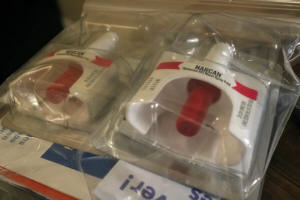High school student helps draft bill to require opioid overdose
medications in Illinois libraries
[March 07, 2025]
By Ismael M. Belkoura and Medill Illinois News Bureau
ELGIN – High school students generally don’t participate in drafting
legislation. Jordan Henry is an exception.
A senior at the Illinois Math and Science Academy, the Elgin native is
working with her local state representative on a bill that would require
public libraries to keep on hand medications that can reverse an opioid
overdose. The legislation would also require libraries to always have at
least one staff member working who is trained on responding to an
overdose situation.
Henry, 18, said she first became interested in substance abuse issues
earlier in her high school career when she learned about the “War on
Drugs,” a policy movement kicked off by President Richard Nixon in the
early 1970s. Though the movement has been through many iterations, it
has consistently focused on preventing drug use through criminalization.
“We’ve really used punishment where care is needed,” Henry said of the
movement.
Henry started volunteering with local nonprofits in the northwest
suburbs of Chicago that tackle substance abuse as well as the stigma
behind it.
Through volunteering, Henry learned about harm reduction strategies such
as syringe exchange programs and access to fentanyl test strips. Opioid
antagonists, which counteract the effects of an opioid overdose, are
another example of harm reduction. The medicine can be injected with a
needle or ingested via nasal spray, like naloxone, the most-common
opioid antagonist.
Henry was a classmate of Democratic state Rep. Anna Moeller’s daughter
when they both attended Elgin High School before Henry transferred to
IMSA, but the state representative only officially met Henry in 2023.
Moeller was collecting ballot signatures door-to-door when she met
Henry’s mother, who connected them, knowing Henry’s interest in public
health policy.

Moeller said Henry presented her with the research she’d done, including
having found similar library-based opioid antagonist programs in other
places around the country. Moeller was complimentary of Henry’s
“follow-through and her maturity” and said she agreed to work with Henry
after hearing her pitch.
Despite being aware of the growing movement to have opioid antagonists
available in public spaces, Moeller said she had never thought of
libraries as a solution.
The proposal, House Bill 1910, does not provide for funding from the
state, but it stipulates the opioid antagonists may be supplied by local
county health departments. If the health departments are unable to
supply the medicine or funding to purchase the medicine, Moeller said
alternative sources would be found.
Training library staff on how to administer opioid antagonists would be
overseen by organizations selected by the Illinois Department of Public
Health.
The proposal does not specify the amount of opioid antagonists each
library should have available, only that “all libraries open to the
general public in the State shall maintain a supply of opioid
antagonists in an accessible location.”
Narcan, a common brand of naloxone, has been available in Chicago Public
Libraries since 2022. The city’s initiative included training library
staff to administer the medicine.

“What this bill would do is to expand that all over Illinois,” Henry
said. “I know it would be super beneficial in the suburbs and especially
in rural areas.”
[to top of second column]
|

Naloxone, pictured here under the brand name Narcan, is commonly
administered through the nasal cavity. The medicine attaches to
opioid receptors in the body, preventing an overdose. (Medill
Illinois News Bureau photo by Ismael M. Belkoura)

In an appearance on the Chicago Department of Public Health’s “Healthy
Chicago Podcast” last year, Chicago Public Library Commissioner Chris
Brown said he wasn’t initially sure the program would have success.
But in the program’s first 20 months, Chicago Public Libraries said it
distributed over 10,000 Narcan kits to the community. Brown said it
helps to provide an alternative to substance abuse or health centers.
“It’s just a public space that removes some of the stigma,” he said
about libraries carrying the medicine. “And I think that’s what I
attribute the incredible uptake in use.”
Moeller said Henry did the majority of the work drafting the
legislation, including research and reaching out to libraries in the
state. The high school student also helped write the bill alongside
members of Moeller’s staff.
The bill was filed in late January and is currently awaiting a hearing
in the House Public Health Committee. Moeller said she is hopeful the
proposal will have bipartisan support, citing past efforts by both
Republican and Democratic legislators to combat the opioid overdose
epidemic.
The Illinois Department of Human Services currently works with 14
organizations across the state to provide Overdose Education and
Naloxone Distribution services. The organizations serve nearly every
county in the state.
Meanwhile, the Illinois Department of Public Health reported a reduction
in opioid overdose deaths from 3,160 in 2022 to 2,855 in 2023 – the
lowest number since 2019. The decrease reflects a similar pattern to
nationwide opioid overdose data, which also shows a decrease over the
last two years.
Despite the statewide decrease in opioid deaths, Henry noted the problem
is not yet under control. She said people in her community are still
dying from overdoses. According to IDPH’s Opioid Data Dashboard,
approximately 110 people experienced overdoses within Elgin’s ZIP Codes
in 2022, the latest data available.
That same year, Elgin had 11 locations where naloxone was distributed,
according to that same online dashboard. Ten of the locations were
pharmacies.
Moeller said she wants Henry to remain involved with the bill as it goes
through the steps of moving a proposed law through the Illinois General
Assembly “so she can see what it’s like to move policy through the
legislative process.”
Henry views the bill as the first step of many when it comes to
providing more resources for those experiencing drug addiction. She
plans on continuing to work on ways the legislature can help with harm
reduction.
“Being able to have a hand in this work, which I think is just so vital,
at such a young age, is really inspiring,” Henry said. “And it shows me
that I can do a lot more.”
Ismael Belkoura is a graduate student in journalism
with Northwestern University’s Medill School of Journalism, Media,
Integrated Marketing Communications, and a fellow in its Medill
Illinois News Bureau working in partnership with Capitol News
Illinois.
Capitol News Illinois is
a nonprofit, nonpartisan news service that distributes state
government coverage to hundreds of news outlets statewide. It is
funded primarily by the Illinois Press Foundation and the Robert R.
McCormick Foundation. |